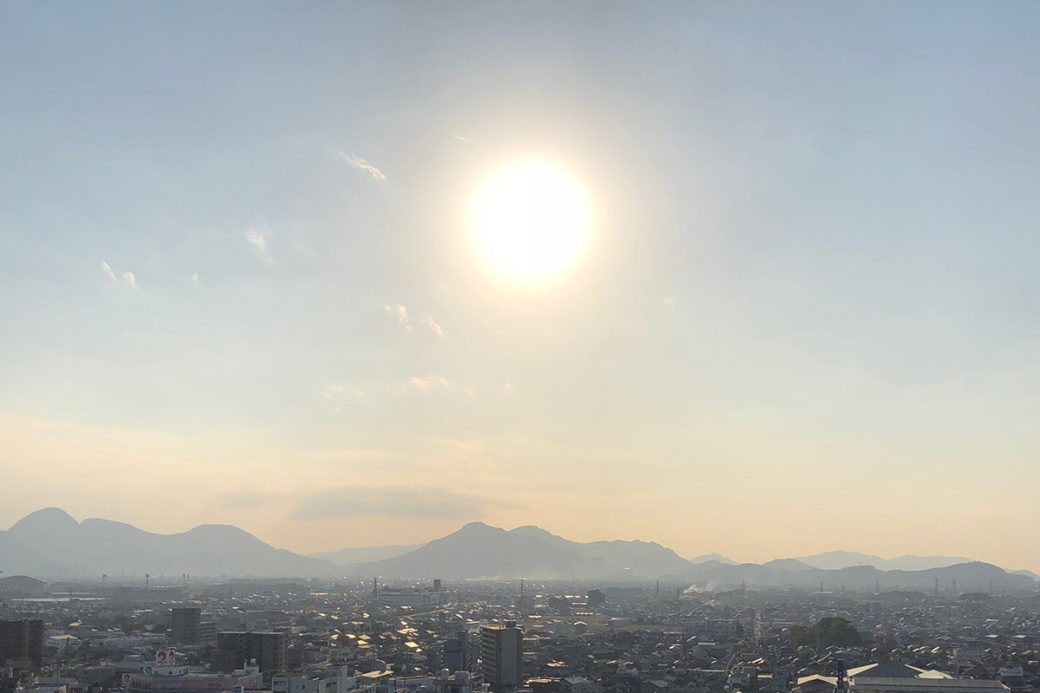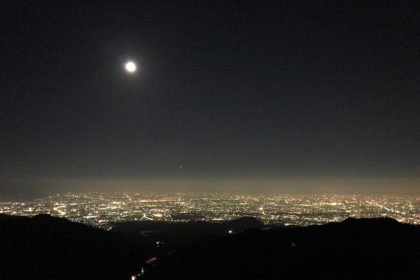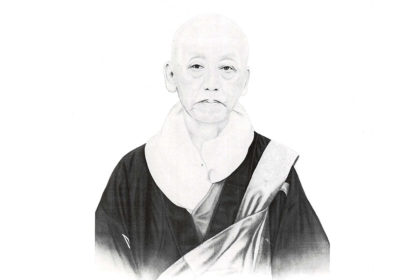Most people only worry about others’ eyes
Followers also worry about Buddha’s eyesGokyōka (No. 484)—didactic poem by Nissen Shōnin
(the Complete Writings of Nissen Shōnin Vol. 15, p. 122)
Since most people in the world don’t understand the world of the Buddhist faith, they believe only what they can see and so lead a life relying on their own power alone. Of course, they don’t believe Buddha sees all of their words and deeds. Today’s Gokyōka 御教歌 says that as followers of Odaimoku 御題目, Namu Myōhō Renge Kyō 南無妙法蓮華経 have faith in the mysterious power of Buddha to see everything, which is called Mei no Shōran 冥の照覧, they should live their life rejoicing but also fearing it.
When you drive a car at night in Japan, you can see a lot of convenience stores. When you look at a store from a distance while waiting for a green traffic light, you can see customers browsing magazines or standing in front of the fridge trying to decide what to buy and a clerk who is putting someone’s shopping into a plastic bag. You might even be able to see what exactly they are wearing or buying. However, when you yourself are in the store, you cannot see anything outside in the dark.
The term Mei no Shōran means that Buddhas, bodhisattvas, and guardian deities of the Lotus Sutra can always see what we think, say and from the dark, but we can’t see them from our world. Mei 冥 indicates the dark, and Shōran 照覧 means the Buddha’s sight.
In chapter 14 of the Lotus Sutra Peaceful Practices 安楽行品第十四, there is a fragment about Mei no Shōran:
The heavenly beings day and night will for the sake of the Law constantly guard and protect them [practitioners of the Lotus Sutra].
It means that Buddhas, bodhisattvas, and especially guardian deities watch us practicing the true Buddhist way day and night and try to protect us even when we don’t expect it.
Mei no Shōran is one of the essential teachings of Honmon Happon 本門八品 part (chapter 15 to 22) of the Lotus Sutra. Within Honmon Happon, the existence of the Primordial Buddha is revealed, and he explains that his lifespan is eternal and he has continued to save all sentient beings from the infinitely distant past to the future. Great Master Nichiren 日蓮聖人, an incarnation of Jōgyō Bodhisattva 上行菩薩, created the mandala of Namu Myōhō Renge Kyō in accordance with the Primordial Buddha’s order, so that we, people in Mappō 末法 period, could serve Buddha directly and deliver our chanting voices to him. To put it simply, the faith in the Lotus Sutra means to believe that Gohonzon, the mandala of Namu Myōhō Renge Kyō, is the living Primordial Buddha and believe in Mei no Shōran. Therefore, we must be sincere about what we think, say and do when walking the path of Buddhist practice.
Since the world is full of contradictions and unfairness, we sometimes get desperate and lose hope. We feel so lonely and helpless when even our family or money cannot solve our problems. Buddha, however, knew what problems we would face in Mappō period, and that is why he and Nichiren Shōnin left us Gohonzon 御本尊—the object of worship of Namu Myōhō Renge Kyō—which we can rely on and trust while living in the chaotic world of Mappō period. Once we become Odaimoku followers aware of Mei no Shōran, we realize how reassuring it is. Our belief in Mei no Shōran or lack thereof shows how strong our faith is. If we always ask ourselves whether our behavior as practitioners of the Lotus Sutra is appropriate and how it is viewed by Buddha’s eye, it can be said that we are the true followers of the Lotus Sutra.
There is an old Japanese word Shindoku 慎独, which means “behave yourself even when you are alone.” This concept is taught in the world of Sadō 茶道—tea-ceremony. It means that if you train yourself to be moderate even when not being observed, you will never expose your rudeness or ignorance in public. It also works the other way round – for example, if you never care about manners while eating because no one is watching you, that bad habit will be exposed when you are in public. Hence, Shindoku says that our behavior when we are alone is so important.
Buddhist practices are fundamentally based on our thoughts, words, and actions, and these three are closely related and strongly affected by each other. In order to succeed in Buddhist practice, such as with the concept of Shindoku, we have to train ourselves to be moderate when we are alone, being conscious of Mei no Shōran.
Hypocrisy is always exposed. You will lose face if you show your cloven foot. Therefore, it is essential to discipline our behavior, words, and minds. Moreover, Honmon Butsuryū Shū 本門佛立宗 teaches that followers should live keeping Mei no Shōran in mind. If we never forget that we constantly live in Buddha’s sight, we will be able to practice honestly everyday and our way of accumulating merit will become more and more genuine. Those who understand the teaching will never hesitate in their practices, so they will continue to improve as practitioners.
To put it in Great Master Nissen’s own words:
Since you don’t bear both Buddha and Nichiren Shōnin in mind, you might not think they are watching you and be negligent in your practice. If you ENSHRINE them in your mind, you will always practice honestly because you will remember they are watching over you.
(the Complete Writings of the Great Master Nissen Vol. 3, p. 148)
People whose faith is not yet strong should chant Odaimoku and do Okyūji お給仕 of the altar (serving Buddha and Nichiren Shōnin) in order to receive rewards and feel Mei no Shōran. Once your faith gets strengthened by your belief in Mei no Shōran, and your practice gains a new depth of honesty, you will be able to feel Buddha’s appreciation of your efforts. We can recognize a strong believer by his sincere way of practicing. Today’s Gokyōka shows us the importance of always keeping Mei no Shōran in mind.
Most people only worry about others’ eyes
Followers also worry about Buddha’s eyes






